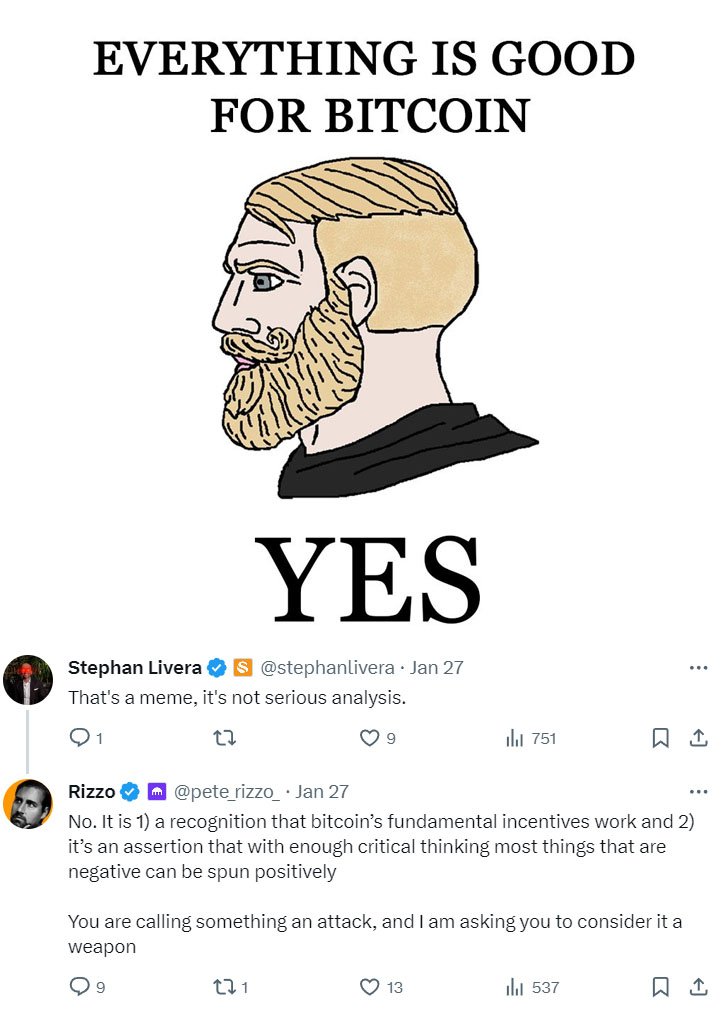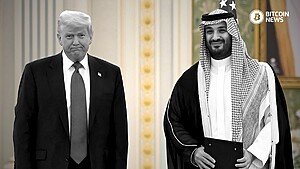Pete Rizzo’s recent appearance on What Bitcoin Did presented a nuanced argument for the value of Bitcoin Ordinals, which struck a chord with the X community, and a number of high profile bitcoiners weighed in with a range of reactions from surprise to utter disdain.

I would fall into the camp Rizzo describes as monetary maximalists. Ironically, I think it was just what we used to call hardcore bitcoiners before Ordinals, who would be defined as bitcoiners who feel that Bitcoin has so much value to offer the world as an apex form of money that other potential uses regardless of validity have no place.
I’m not interested in NFTs so I haven’t followed Ordinals closely. I don’t know how to buy one. I believe our primary responsibility in bitcoin today is to help adoption and be good stewards of it for future generations who will need it even more than we do. However, I am anti-censorship and have been very interested in the debate around filtering mining pools. It was Andy Edstrom’s reaction to the episode that piqued my interest to tune in.
It’s a sensitive topic, debating how jpegs of cats might be beneficial in accelerating bitcoin adoption and whether there is merit in using block space to enable this type of behavior. Or whether anything can even be done about it, and if there can be, if it is the right thing to do.
Rizzo’s assertion is that it’s happening and it’s going to continue to happen so we might as well be able to talk about it. The passion of Bitcoiners is truly remarkable, as evidenced by the intense reactions sparked by a topic like this.
Certainly, in part, the stark contrast between the mission of addressing the issues with fiat money and the goal of proving ownership of a jpeg contributes to this distinction. However, Rizzo was at least partly successful in striking some compelling points, which even if invalid, did create a substantial reaction.
Bitcoin Ordinals Debate: Should Bitcoin Only Be Money?
NFTs have a market, and that market creates reasons for other networks to exist. Powerful interests such as Wall Street and Silicon Valley have big bets on other chains and Rizzo argues that ordinals invalidates the position that bitcoin is a single application blockchain.
In Rizzo’s eyes this has two benefits. One is it calls into question the reason for any of the other chains to exist, and two is, it creates a reason for those groups (Wall Street & Silicon Valley) to hedge by developing on Bitcoin. He makes the argument that the reverse scenario is also true; a world where bitcoin does not have NFTs. It should also be considered that a world where some part of the “crypto” apparatus is valuable is a world where someone has some incentive to hold some crypto other than Bitcoin.
The caveat here is that “development” presumably would be a mix of other quasi and non monetary related features, and in this case, those aspects might not offer a lot of real world value. If bitcoin development turns it into things other than the best money ever, is that a good thing? Moreover, does Bitcoin need to attract money currently being invested in other chains to win over the long run?
The tradeoffs are not as simple as Rizzo suggests. Bitcoin was built to do something very specific and with that comes real limitations. Stefan Livera penned a detailed retort explaining specifically the dangers of some of those, such as UTXO explosions which have real consequences for the network today.
NFTs are Scams
Not only do NFTs on Bitcoin clog the blockchain and raise fees, they are providing a feature which is antithetical to the core purpose of Bitcoin. Bitcoin Artist Madex covered this in detail on a recent episode of The Block Reward. NFTs run counter to core values of Bitcoin no matter how you slice it. NFTs are not scarce, take little work to produce, and are essentially pump and dump schemes or tools for money laundering. Most NFTs go to zero.
The ethics of NFTs and the motivations behind many of the projects are questionable. They do note really belong on Bitcoin. This gets at the core of why I think so many Bitcoiners are irritated at the thought of NFTs becoming a normalized aspect of Bitcoin. Even Rizzo commented that a world where “Bitcoin looks more like Solana is a world where Bitcoin looks less special”. A more apt way of phrasing this is to say it is anti-Bitcoin to work towards bringing scams to Bitcoin.
Censorship
“At the end of the day, if you are imposing your own ideological framework that tries to shift Bitcoin’s incentives, then maybe you are the attack on Bitcoin.”
— Pete Rizzo
One argument presented by Rizzo that does merit consideration is that the anti-ordinal efforts are spending time and money working on technology designed to censor bitcoin transactions, and that time and energy could be better spent building. He further suggested it also potentially endangers Bitcoins claim of being censorship resistant.
The idea that some kinds of activities will be allowed on bitcoin and others will not, could be potentially a slippery slope. While not totally analogous, Rizzo did point out that Bitcoin consensus seems to have adopted a pro-ETF stance even though ETFs are non-Bitcoin products.
It’s an unfair comparison in my view, as far as we can tell, ETFs do not appear to have a negative effect on price of data or traffic on the network. If anything, you could make the argument that ETFs are almost acting as a layer 2, reducing the load on the base chain. They are also arguably a monetary use case.
However, it’s a fair point to say that the practice of actively moving to snuff out activities deemed undesirable in the current times, could set a dangerous cultural precedent in Bitcoin.
Conclusion
The reason this particular episode got the attention it did, is because it was a great conversation. Personally it did nothing to persuade me that Ordinals have any lasting value. I think they are all scams that will trend to zero against bitcoin, just like everything else. But, I also think that hearing alternative perspectives we disagree with, even just to understand them, is a worthwhile endeavor and I applaud Rizzo for his tact in delivering a number of ideas bitcoiners disdain.
Maximalists are right to take this issue seriously. Bitcoin was a one time event, and that means we have one shot at ending the extractive and usurious fiat system. At the same time, Ordinals has created the reality that other potential non-monetary use cases for Bitcoin will evolve over time as well. As Bitcoin matures, there will be more disagreements about what kinds of activities are appropriate for the network.
Bitcoin is a complex network of incentives and an evolving tool that will almost certainly function differently in twenty years than it does today. Who’s to say who is right? I believe intellectual curiosity is healthy. Watch the interview and see what you think for yourself.










